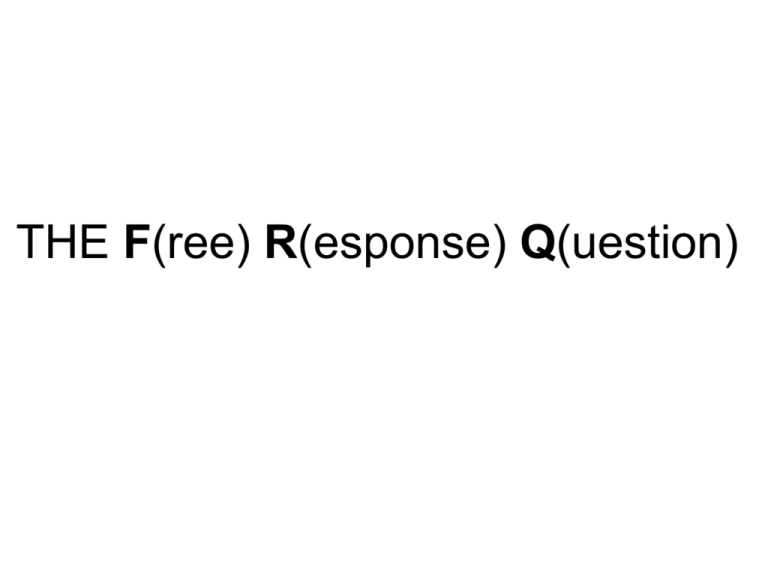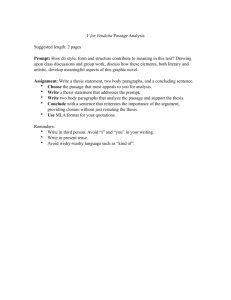08-09 Test
advertisement

THE F(ree) R(esponse) Q(uestion) Structure and Stress • Same structure as the DBQ, but no documents to analyze – – – – Intro Thesis Topic Sentences (3!) Facts that support your thesis and topic sentences (tons!) • Be specific! • Hardest part of the test often the questions are ridiculously vague – Don’t stress- very few students will ‘own’ this part of the test. – You’ve already been writing FRQs all year the outlines! Good News- You Get to Choose! 08-09 Test Choose one of these! 2. Analyze the long-term and short-term factors responsible for the disintegration of communist rule in TWO of the following states: Czechoslovakia East Germany Hungary Poland 3. Considering the period 1918 to 1948, analyze the political and diplomatic problems faced by TWO of the following newly created Eastern European states. Austria Czechoslovakia Hungary Poland 4. Analyze the extent to which Frederick the Great of Prussia and Joseph II of Austria advanced and did not advance Enlightenment ideals during their reigns. And one of these… 5. Compare and contrast the economic factors responsible for the decline of Spain with the economic factors responsible for the decline of the Dutch Republic by the end of the seventeenth century. 6. Analyze various ways in which the Thirty Years’ War (1618-1648) represented a turning point in European history. 7. Analyze how Galileo, Descartes, and Newton altered traditional interpretations of nature and challenged traditional sources of knowledge. Usually a range of difficulty. Which are the easiest? How to Tackle the FRQ… • You have 30 minutes. – Approx 5 min prep time and 25 minutes writing time • Step #1- brainstorm relevant facts – You will find that you know more than you think you do! • Step #2- group facts into relevant categories – If you are having trouble, think of Persia themes. • Step #3- Write an intro, then your thesis. Then write. Stuff your answer with relevant facts! Grading Rubric 9-7: Stronger Has a clear, well-developed thesis Is well organized Addresses the prompt directly and completely Supports the thesis with ample specific evidence Carefully stays within the time period specified in the question May contain minor grammar errors; even a 9 need not be flawless 6-4: Mixed (Please use the symbols only to indicate problem areas) Contains a thesis, perhaps superficial or simplistic Has minor to medium organizational issues Attempts to address the prompt, but may not succeed fully Some specific evidence in support, but not enough (or inaccurate supporting evidence) mostly stays in the time period specified, but not always contains notable grammatical errors 3-2: Weaker Thesis is confused, absent, or merely restates the question Has medium to major organizational issues Has a medium to major problems addressing the prompt not nearly enough specific evidence and/or evidence may contain major errors. May use wrong time periods writing has significant grammar errors





